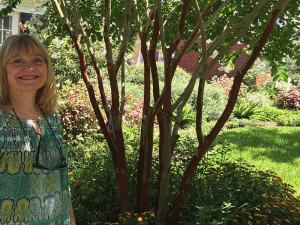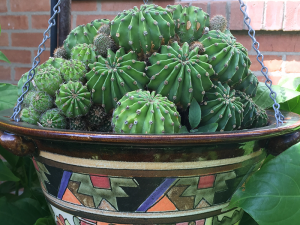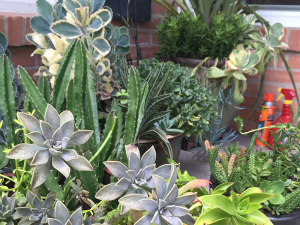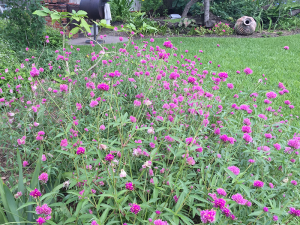Living With Snakes
First and foremost, I want to say that gardeners should love snakes! Snakes are a very important part of our ecosystem, and they keep away rats, mice, and other pests from our houses and gardens.  With all this rain, you have a much higher chance of running into snakes in your yards and garages (hopefully not in your house). Most snakes are good, but there are a few that you should watch out for. In our area we have coral snakes (red-and-yellow, Kill-a-fellow!), rattlesnakes, and water moccasins. If you see a snake near you, the best thing is to leave it alone! If it’s a garden snake, then it’ll keep your garden in top shape by deterring unwanted rodents. If you’re unsure if a snake is venomous, please call Animal Control (361-232-5627) BEFORE you try to relocate/dispose of it. –Marta
With all this rain, you have a much higher chance of running into snakes in your yards and garages (hopefully not in your house). Most snakes are good, but there are a few that you should watch out for. In our area we have coral snakes (red-and-yellow, Kill-a-fellow!), rattlesnakes, and water moccasins. If you see a snake near you, the best thing is to leave it alone! If it’s a garden snake, then it’ll keep your garden in top shape by deterring unwanted rodents. If you’re unsure if a snake is venomous, please call Animal Control (361-232-5627) BEFORE you try to relocate/dispose of it. –Marta

Make Room For These Friendly Snakes!
Time for vinca?
We all love our vinca (a.k.a. periwinkle) and the time is finally right for them!! With the rainy spring this year we delayed bringing them into the garden center. They are susceptible to Phytophthora Stem Blight and Root Rot Fungus primarily caused by heavy rains. Preventing fungus is always better than curing it once it appears. Water management is the main preventative measure. Frequent watering, even in moderate to dry sites, can make conditions favorable for development of branch blight and root rot. It is also important to provide excellent drainage. When preparing a planting  bed, thoroughly dig up the entire area adding plenty of organic matter such as Cotton Burr Compost.Treat the area with Actinovate, a biological fungicide to help prevent the disease. Space the plants 8-10 inches apart and mulch heavily with Hardwood Mulch to prevent water from splattering off the soil. Also never water over the top of the plant. Always water slow and thorough on the ground below the plant. It looks like we’re going to have warm dry days ahead which is what makes vincas happy!! –DeAnna
bed, thoroughly dig up the entire area adding plenty of organic matter such as Cotton Burr Compost.Treat the area with Actinovate, a biological fungicide to help prevent the disease. Space the plants 8-10 inches apart and mulch heavily with Hardwood Mulch to prevent water from splattering off the soil. Also never water over the top of the plant. Always water slow and thorough on the ground below the plant. It looks like we’re going to have warm dry days ahead which is what makes vincas happy!! –DeAnna
 Each week I will try to introduce you to an organic product to help make your gardening easier as well as safer for you and the family. Once you begin working with nature, you will be surprised how much happier and healthier your plants are. You will also see how your job is easier. Less watering, less spraying, less fertilizing and yet, beautiful plants. Lets enjoy our gardens, not be a slave to them.
Each week I will try to introduce you to an organic product to help make your gardening easier as well as safer for you and the family. Once you begin working with nature, you will be surprised how much happier and healthier your plants are. You will also see how your job is easier. Less watering, less spraying, less fertilizing and yet, beautiful plants. Lets enjoy our gardens, not be a slave to them.
 I’ve always known Cherry Green is an avid gardener. Year round, no matter how hot or cold it is, she remains a gardener. Whenever I see her about town, she asks if we have this or that, and most of the time it’s not your ordinary ligustrum or Asian jasmine. A few weeks ago, she was in the store looking for pink gaura, one of my favorites, but again, not a typical Corpus Christi landscape plant. In conversation, I asked if I could come tour her garden. What a treat!
I’ve always known Cherry Green is an avid gardener. Year round, no matter how hot or cold it is, she remains a gardener. Whenever I see her about town, she asks if we have this or that, and most of the time it’s not your ordinary ligustrum or Asian jasmine. A few weeks ago, she was in the store looking for pink gaura, one of my favorites, but again, not a typical Corpus Christi landscape plant. In conversation, I asked if I could come tour her garden. What a treat! Interestingly, when she acquires a new plant, she enters it in her data base by common and scientific name. In addition, she photographs her succulents since sometimes they are difficult to differentiate. I also think that could be a great way to record plant performance, bloom cycles, etc…
Interestingly, when she acquires a new plant, she enters it in her data base by common and scientific name. In addition, she photographs her succulents since sometimes they are difficult to differentiate. I also think that could be a great way to record plant performance, bloom cycles, etc…  There are crape myrtles, a mountain laurel and a grapefruit, specimen plumeria, durantas, firecracker plant, irises, altheas, pride of Barbados, porter weed, night blooming jasmine, Indian carnation, milkweed, a beautiful specimen white bird of paradise, beautiful blooming gomphrena and a nice assortment of vines on their back and side fence. Again, they have a great collection of succulents in an interesting collection of containers. She jokes that her lawn is disappearing as her garden beds get larger.
There are crape myrtles, a mountain laurel and a grapefruit, specimen plumeria, durantas, firecracker plant, irises, altheas, pride of Barbados, porter weed, night blooming jasmine, Indian carnation, milkweed, a beautiful specimen white bird of paradise, beautiful blooming gomphrena and a nice assortment of vines on their back and side fence. Again, they have a great collection of succulents in an interesting collection of containers. She jokes that her lawn is disappearing as her garden beds get larger. 

